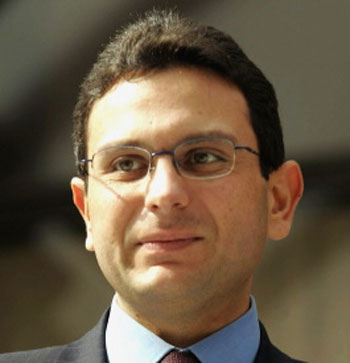U.N. Warns of Fragile Situation in Lebanon
By EDITH M. LEDERER, Associated Press Writer
UNITED NATIONS – The U.N.’s top political official warned that despite recent progress the situation in Lebanon is fragile and violence between Israelis and Palestinians is steadily increasing.
Kieran Prendergast, the undersecretary-general for political affairs, called Wednesday for an end to bombings and acts of intimidation as Lebanon prepares for parliamentary elections starting May 29. The elections are happening under a new government that was installed following the assassination of former prime minister Rafik Hariri.
Prendergast also urged Israel and the Palestinians to meet on a continuing basis to address the rising violence that is “compounding a corresponding deterioration in trust and confidence between the two sides.”
 It was a coincidence, but doubtless one many would find illuminating, that Walid Jumblatt was recently reading (and may still be) Rebecca West’s “The New Meaning of Treason.” For the prevalent view among many Christian voters today is that the Druze leader is a compulsive turncoat. A title he is far less likely to be caught with, however, is “Great Expectations.”
It was a coincidence, but doubtless one many would find illuminating, that Walid Jumblatt was recently reading (and may still be) Rebecca West’s “The New Meaning of Treason.” For the prevalent view among many Christian voters today is that the Druze leader is a compulsive turncoat. A title he is far less likely to be caught with, however, is “Great Expectations.” participate in the upcoming parliamentary elections to reform Lebanon and help it realize its sovereignty, freedom and independence.
participate in the upcoming parliamentary elections to reform Lebanon and help it realize its sovereignty, freedom and independence. BEIRUT, Lebanon – In a sign of the dramatic changes in a Lebanon free of Syrian control, Christian opposition leader Michel Aoun visited his former arch foe in jail Wednesday and called for his release after 11 years in prison, mostly in solitary confinement in an underground cell.
BEIRUT, Lebanon – In a sign of the dramatic changes in a Lebanon free of Syrian control, Christian opposition leader Michel Aoun visited his former arch foe in jail Wednesday and called for his release after 11 years in prison, mostly in solitary confinement in an underground cell. May 18, 2005
May 18, 2005  Art students paint on fabric covering a 5-meter-high wall of sandbags, surrounding the United Nations offices in Beirut, Lebanon, Wednesday, May 18, 2005. The sense of security built up over years of Lebanon’s postwar calm was shattered when a series of bomb blasts hit the capital over the past three months. A U.N. mission is scheduled to arrive in Beirut later this week to conduct an inquiry on the bomb blast that killed former Lebanese Prime Minister Rafik Hariri. (AP Photo / Hussein Malla)
Art students paint on fabric covering a 5-meter-high wall of sandbags, surrounding the United Nations offices in Beirut, Lebanon, Wednesday, May 18, 2005. The sense of security built up over years of Lebanon’s postwar calm was shattered when a series of bomb blasts hit the capital over the past three months. A U.N. mission is scheduled to arrive in Beirut later this week to conduct an inquiry on the bomb blast that killed former Lebanese Prime Minister Rafik Hariri. (AP Photo / Hussein Malla)
 Christian civil war foe in his prison cell near Beirut on Wednesday, drawing a line under a bloody rift that tore their community apart 15 years ago.
Christian civil war foe in his prison cell near Beirut on Wednesday, drawing a line under a bloody rift that tore their community apart 15 years ago.


